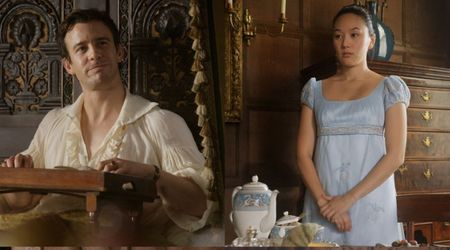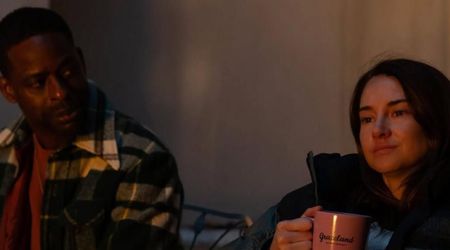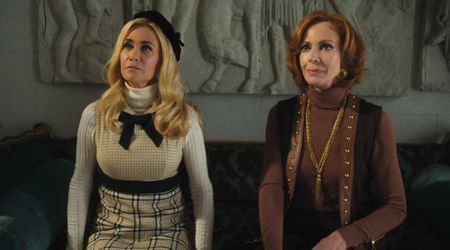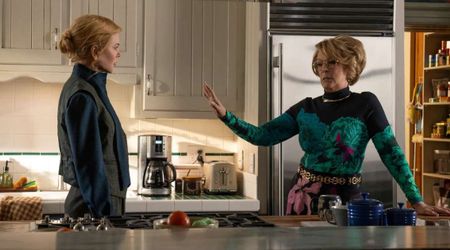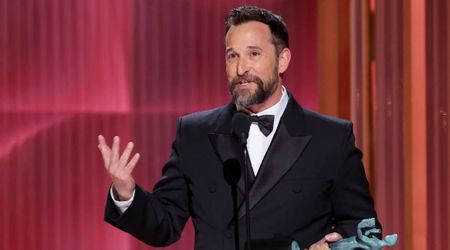'Patrick Melrose' episode 2, 'Never Mind,' unleashes the full might of Hugo Weaving's moral desolation

Showtime's 'Patrick Melrose' began with a bang last week, following a grown-up Patrick (Benedict Cumberbatch) who is in the throes of a debilitating drug addiction - heroin, cocaine, quaaludes, you name it - as he learns that his father, the man who has haunted his every living moment, has finally passed away. And so came back the flood of repressed memories, painful flashbacks, and an internal struggle to comprehend the complicated relationship he shared with a complicated man; all of which he deals with by drowning himself in an endless flow of every pain-numbing narcotic imaginable.
Inside the prison that Patrick has constructed for himself is a man who is desperate to get away from the depravity; a man who wants nothing more than to lead the semblance of a normal life. A failed suicide attempt notwithstanding, Patrick wants to kick his vices to the curb, and for good.

Based on Edward St Aubyn's semi-autobiographical pentalogy - 'Never Mind', 'Bad News', 'Some Hope', 'Mother's Milk', and 'At Last' - creators of the TV adaptation cleverly managed to hook audiences' attention by forgoing the chronological order of the books beginning the series with the second, which is the most fast-paced of the five, and portrays Melrose at his sneering, satirical, snappy, hedonistic best. Episode Two, 'Never Mind,' returns to Patrick's upbringing in the family's idyllic mansion in the south of France, and delves into the incidents that punctuated his tortured childhood.
The episode begins with a revisiting of the first episode as Patrick, in the midst of a smack high, responds slurringly to the news of his father's death. Accompanying this is imagery of the corpse undergoing its cremation and Patrick going to war with the ashes in a fit of rage; typifying his inner conflict and his ongoing battle against coming to terms with the loss.
'Never Mind' follows an inquisitive younger Patrick and explores his relationship with a distant mother, an abusive father, and family friends who can do little more than watch as he despairingly craves for affection, but is denied at every turn. Patrick even ends up hurting himself on purpose just so he can experience sympathy, empathy, and most importantly, a human touch.

We also get a first look Eleanor Melrose (Jennifer Jason Leigh), Patrick's mother, and who is the descendant of a wealthy American family based in Cincinnati, as she endlessly indulges herself in alcohol and cigarettes, similarly desperate to get away from the clutches of a man who is practically unrecognizable to her.
While she admits he had been a difficult man when they had met, his transformation from an aspiring but talented composer to a soulless soldier and surgeon to his bitter, misogynistic, current incarnation had drained her of any latent affection and left her scared of his mere shell of a presence.
Aubyn had stated in interviews that his mother "really was a person of good intentions, but if ever it was clear that good intentions were not enough", and we get to see why he thought so as she struggles to balance her motherly instinct of wanting to be there for her son and a fear that her husband would grow jealous of their closeness.

The episode gives us a peek into David Melrose's philosophy of what he saw as the right way to raise a child. "Nothing but the best, or go without," "Never apologize, never explain", "Observe everything, trust no one", "Never try, effort's vulgar", "Things were better in the 18th century", "Despise all women, but your mother most of all", were a few that Patrick rattled out in 'Bad News,' with another, "Think for yourself, never let anyone take important decisions for you" playing out as David hoists up Patrick by his ears and convinces him to let go, only to continue to painfully keep holding him up.
His musical past is brought to the fore with a series of scores on the piano and underlines the resentment and anger David is feeling at an unfulfilled past. Starved of an outlet, he takes out his disappointment on his vulnerable son.

Before sexually assaulting Patrick, he offers up the story of King Shaka, a Zulu warrior, as an explanation for what was about to happen to him, proclaiming that the resentment, pain, and cruelty that was about to be inflicted upon him was, in fact, a gift. He also suggests that Patrick would be grateful for the "skill of detachment" that he had instilled in him; a claim that was not too far-fetched as it was indeed a characteristic obvious in the pilot.
The stiff upper-class English 'party' in the episode also introduces us to Nicholas (Pip Torrens), Patrick's godfather, who seems in awe of David more than anything else. His first appearance in 'Bad News' gave us the impression of a man who was almost infatuated with his father's principles, with 'Never Mind' going into further detail on what shaped this perspective. On the other side of that spectrum is Anne (Indira Varma), who Patrick is shown being grateful to, and who seemed to be the only one that could fathom what he was going through.
'Never Mind' subtly intersperses shots of the current Patrick undergoing the numerous withdrawal symptoms, providing the thread that ties the two episodes together; the proverbial cause and effect. Will he recover from the emotional scars and psychological fractures that are just as much a part of him as his dry, acerbic wit?
Preview for episode 3: 'Some Hope'

Patrick is in attendance at a party, which he is told is meant to be everything but fun. Trying to stay clean and away from alcohol and drugs, he is confronted from all corners with the very vices he's trying to escape from and has to reinforce his will to reject all offerings when his previous iteration would have chugged it down without a second thought.
There's also set to be a defining and watershed moment in Patrick's life on his long road to recovery: He will finally reveal the extent of his childhood abuse at the hands of his father to his close friend. 'Some Hope' will premiere on Showtime next Saturday, May 26.

